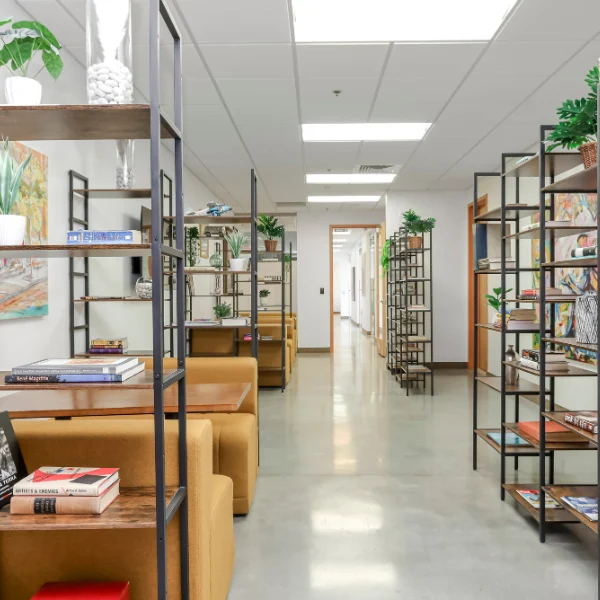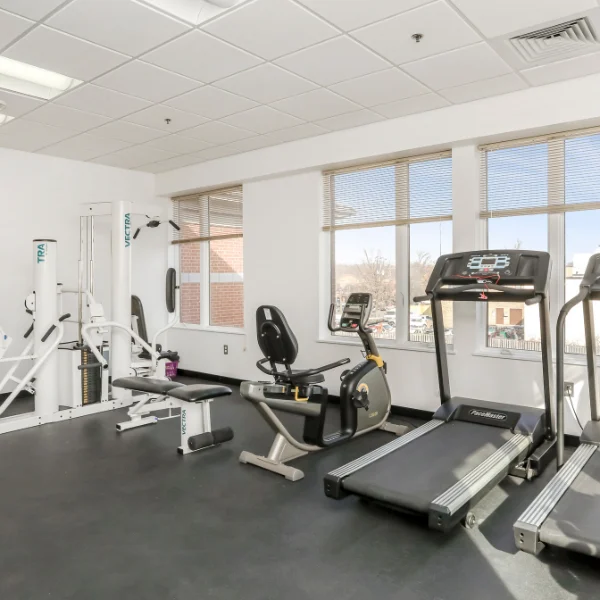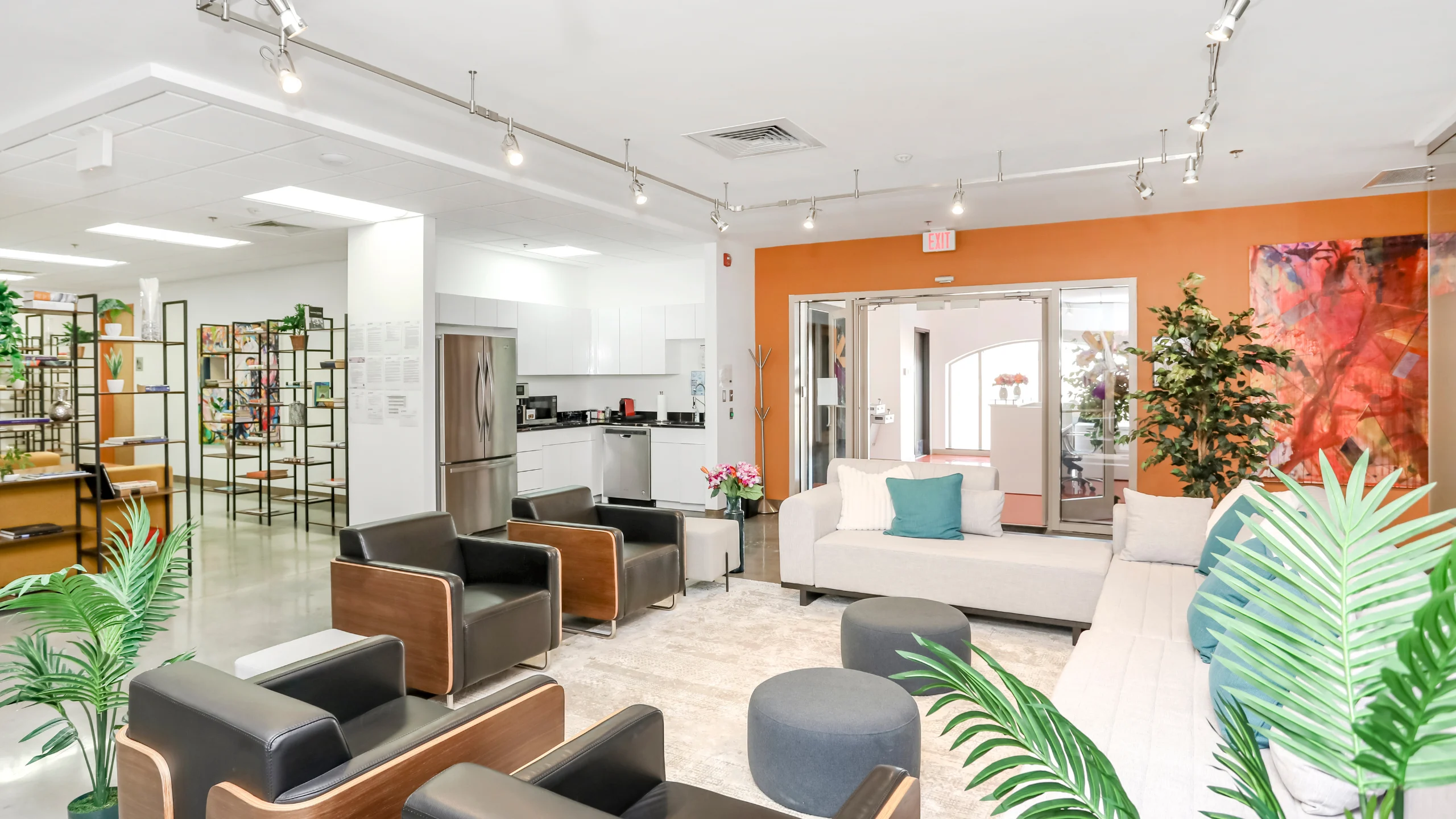Find out how Novara Recovery Center can help you find the best inpatient drug rehabs in Virginia right now.
Dealing with drug and alcohol addiction, along with mental health issues, is a personal journey. Each person’s recovery process is different, and there is no single solution that works for everyone. When you seek professional help, you open the door to various options, and you can customize some to meet your unique needs.
Inpatient rehab is one of the best ways to tackle serious substance use issues. It provides a safe and organized place to focus on improving. You can escape the distractions and stress of daily life. It creates a safe and dedicated space where you can start to rebuild your life after the harsh impacts of addiction.
Inpatient rehab is a program where you live at a facility. You focus completely on recovering from drug or alcohol addiction. It’s not just about stopping drug use and removing addictive substances from your body.
It’s also about healing in a safe and supportive place. You will receive professional care at every step of the process. Inpatient rehab helps you focus on your recovery. It keeps you away from the distractions and triggers of daily life.
You might come across the terms “inpatient rehab” and “residential care,” while they sound similar, they’re not identical. Here’s the key difference:
Whether you are in inpatient rehab or a residential treatment program, the goal is the same. It is to help you build healthy coping skills. The program will give you the tools you need to stay sober. After the program ends, you will learn how to live a fulfilling life without substances.


Our vision is to be a leader in behavioral healthcare, transforming the lives of those affected by substance use and co-occurring disorders. We envision a future where recovery is attainable for everyone, where stigma is eliminated, and where holistic, individualized care is accessible to all. By advancing treatment methodologies, fostering community partnerships, and advocating for mental health and substance use disorder awareness, we aim to empower individuals to achieve their fullest potential and lead healthy, fulfilling lives.
We offer a variety of drug & alcohol detox options from trusted inpatient detox partners to our outpatient detox management services, Novara Recovery Centers aims to provide you with addiction treatment services in Virginia that are designed for your individual success in recovery. Keep reading to learn more about how detox works, what to expect from detox and how we can help you.
If you or a loved one is struggling with substance abuse or co-occurring disorders, Novara Recovery Center can help. We offer a variety of treatment options including inpatient treatment through our trusted network of residential partners. Learn more about how inpatient treatment works and how it can help you find long-term recovery from substance use.
If you are looking for a partial hospitalization program in Virginia, Novara Recovery is your best choice. Our flexible and accessible treatment programs offer you the benefits of inpatient treatment without the complicated residential stay. To learn more about what PHP is and how our partial day program can help, keep reading.
The intensive outpatient program (IOP) in Fairfax at Novara Recovery Center was designed to provide those struggling with substance abuse & co-occurring disorders with flexible treatment options that world around your personal schedule. Our intensive therapeutic solutions offers you a solid foundation for long-term success in addiction recovery.
The outpatient addiction treatment program at Novara Recovery Center aims to empower you with the tools needed in order to achieve recovery. Through our integrative therapeutic solutions, you or your loved one can expect to learn valuable life skills that lead to a transformative experience in healing and wellness.
We know that cost is a major factor for most people when seeking treatment for drug & alcohol abuse in Virginia. Novara Recovery Center works with most major insurance plans to help cover up to 100% of the costs associated with treatment at our program. To find out your personal options for treatment, get a free verification of insurance benefits right now by clicking the button below.









If you are considering rehab, remember that recovery is not just about getting clean. It is also about healing your body and mind. After you’ve dealt with the physical side of substance use, the next step is often addressing the psychological aspect. For many people, inpatient rehab is the best option, but how do you know if it’s right for you?
There are several things to consider when deciding if inpatient treatment is the best choice. Medical professionals will evaluate your situation and make recommendations based on specific criteria. Insurance carriers will also play a role in determining what kind of treatment you can access.
If you feel alone or live in a chaotic environment, inpatient care can help. It offers the support you need.
Your location and insurance provider may have specific rules. However, some personal factors can help you decide if inpatient rehab is right for you:
When picking a rehab center, choose one that has a complete treatment plan. It should offer different services, such as:
A program like this allows you to enter at the level that fits your needs and progress at your own pace. The real benefit of these programs is how different levels of care work together. There is coordination between treatments. When you move to a new stage of recovery, you know the staff and the process.
This support helps you succeed in the long run. You will have the tools and people to reach your recovery goals.

Inpatient rehab provides several key benefits that enhance the chances of successful recovery. Here are the main advantages of this type of treatment:
When you start your recovery journey, detox is often the first step. It is where your body and brain begin to heal from substance use. The process can be challenging, but it’s much more manageable with the proper care.
At an inpatient rehab, medical professionals will watch you around the clock. They’ll monitor your progress, manage withdrawal symptoms, and step in if anything unexpected happens.
Many patients believe that the structured environment of an inpatient addiction treatment center is crucial for their recovery. You’ll follow a consistent daily routine, with trained professionals guiding you every step of the way.
This structure helps follow therapy programs. It prevents boredom and manages withdrawal symptoms. It also reduces the chances of returning to old habits.
It’s also an excellent opportunity to build new, healthy habits and develop coping skills to manage stress. You’ll even work on life skills like communication and time management—tools that will serve you long after rehab.
Choosing to go to a live-in drug rehab center means you are fully committing to a clear path to recovery. Residential or inpatient treatment facilities offer the best care for drug or alcohol addiction. They are better than other treatment programs.
Expect to work on both the emotional and practical aspects of your recovery. Along the way, you’ll encounter therapies designed to strengthen your journey, including:
There’s something powerful about being around people who really understand what you’re going through. Group therapy and social activities can provide that support—it’s a reminder that you’re not alone on this journey. It helps you feel less isolated and gives you that extra push when you need it the most.
Inpatient rehab programs vary depending on the specific needs and preferences of individuals. Here are the main types of inpatient rehab options available:
Traditional inpatient or residential rehab programs are built with clear goals in mind. They provide a structured approach to recovery, with resources like detox, medication-assisted treatment, individual therapy, group sessions, family counseling, and recreational activities. These programs are designed to be easy to access, giving you a direct and accessible path to the intensive care you need.
Luxury rehabs are addiction treatment centers. They offer great care in a setting that feels more like a retreat than a regular rehab. This might be what you’re looking for if you want a facility that offers high comfort levels and efficient treatment. You can concentrate on healing in a quiet, private setting with few outside distractions at these facilities.
In addition to evidence-based therapies like behavioral treatments, luxury rehabs provide many extra amenities. These features help make your stay more relaxing and restorative. Some of these might include:
This type of rehab goes beyond just treating the addiction—it focuses on healing the whole person: body, mind, and spirit. Holistic programs blend traditional therapies with alternative approaches like structured exercise programs, nutritional counseling, and carefully chosen holistic therapies.
This could be a good choice if you want a balanced approach to recovery. It focuses on physical health as well as emotional and mental well-being. Many inpatient rehab programs include a range of holistic therapy options like:
Substance abuse and mental health challenges are pretty common these days. A recent National Survey on Drug Use and Health for 2023 revealed that 35% of adults in the U.S. who are 18 or older and have a mental health disorder also face challenges with substance use disorders.. This combination is known as a co-occurring disorder. It means you are facing both substance abuse and a mental health issue at the same time.
When you have a co-occurring disorder, it’s crucial to treat both issues together. Treating only one won’t give you the support you need to recover. At a dual diagnosis treatment center, professionals specialize in helping people like you who face these challenges. They understand how both conditions can exist simultaneously or even one after the other.
Some of the most common mental health disorders that often show up alongside addiction include:
Both mental health and substance abuse disorders can mess with your brain’s chemical balance, which is why treating both is so important. If your mental health symptoms worsen, it can be harder to stay sober. This may lead you to self-medicate with drugs or alcohol.
At a dual diagnosis inpatient treatment center, you will have access to experts 7 days a week. They understand both addiction and mental health. They’ll give you the tools and support to heal and move forward with your life.
Our caring professionals are standing by around the clock, ready to address all your questions.
Recovering from drug or alcohol addiction has four main steps. First, evaluate your situation.
Next, detoxify your body. Then, connect with mental health professionals. Finally, ensure you have ongoing support after treatment.
When you begin the assessment and intake process, the goal is to help the team understand your unique situation. This way, they can develop a treatment plan that truly fits your needs. Here’s what you can expect during this part of the journey:
They will ask about your education, work, family, and social life. They will also ask about any past experiences with addiction treatment. This conversation helps them understand where you’re coming from.
They will look for any issues that may need care during treatment. They will consider your lifestyle and cultural background. They will also think about any religious or spiritual beliefs that might influence your treatment plan.
Every part of the intake process is crucial. The more information you provide, the better equipped the team will be to tailor your treatment to fit your specific needs. It’s all about creating a plan that works for you.
If you have been having trouble with substance use, like alcohol or drugs, your body can become dependent on them. Detox is all about helping your body safely clear out these substances so you can start to heal. During this time, you’ll likely experience withdrawal symptoms as your body adjusts. These can vary, but some of the most common ones include:
Detox isn’t about long-term recovery, which focuses more on the behaviors and situations tied to addiction. Instead, it’s a short-term process to help your body cleanse itself safely. The good news is that, with proper care, doctors can use safe medicines. These can help ease your symptoms and keep you comfortable while your body detoxes.
This is where the hard work begins. You will participate in group meetings, one-on-one therapy, and other notable therapies like cognitive-behavioral therapy (CBT). These will help you find better ways to deal with problems and investigate why you became addicted. These sessions aim to help you understand your actions, deal with past pain, and start fresh.
Aftercare is important for your long-term success. It helps you maintain the healthy coping skills you have learned. It also ensures the structure you got used to staying with you after rehab. Most people find it particularly handy for many reasons:
Aftercare helps you stay connected with your support team. It gives you guidance and tools to stay sober. You can also learn to handle real-life challenges after rehab.
Aftercare helps you see what makes you want to use it again. It also helps you control those urges and handle other problems at the same time. This support helps you avoid old, unhealthy habits. It also keeps you focused on your recovery.
If you take medication for mental health conditions or other issues, your aftercare plan will include managing your medication. It helps you get the drugs you need when you need them. It also helps manage side effects and other issues. This way, you can keep your addiction treatment steady as you move to an outpatient program.
Some aftercare programs offer support to help you get back on track with your education or career. If addiction has affected your work life, this can be an important part of your recovery. It can help you rebuild your future.
In an inpatient rehab setting, you’ll find a daily routine that’s both structured and consistent. This framework is important for creating stability and accountability. This is especially true during the early stages of recovery.
Your daily schedule will likely include different activities. These activities will help you heal physically, emotionally, and mentally.
It is important to create stability and accountability. This is often vital in the early stages of recovery. Your day will likely be filled with different activities designed to help you heal physically, emotionally, and mentally.
Group therapy is a key part of treating addiction, and there’s a good reason for that. It provides many benefits that are often hard to get from one-on-one therapy.
One of the biggest pluses is the feeling of being connected. When you’re in a group, you don’t feel alone in your problems. You can talk about your experiences, learn from others, and see that you’re not the only one dealing with tough situations.
Some key benefits of group therapy include:
In inpatient rehab, individual therapy sessions help you explore personal challenges. You can set meaningful goals and develop tools to cope better. These sessions are a chance to focus entirely on you in a safe and confidential environment. Here’s what you can look forward to:
What to Expect
What You Can Work On
Designers of rehabilitation programs understand that getting better isn’t just about healing your body or mind. It’s about helping all parts of you recover.
That’s why many addiction recovery centers offer various activities. These activities help keep you engaged and make you feel good during recovery. These activities aren’t just fun—they also support your recovery journey in meaningful ways.
Here are some activities you might come across:
It can seem like an uphill battle to stay sober in the early stages of your recovery. After long-term drug or alcohol use, the triggers and cravings can become unbearable. It is common to experience temptation, but you don’t have to go through this process by yourself. The staff at Novara Recovery Center is here to support you during these trying times.
Don’t wait to take control of your future. Call us today at (703) 705-7870 or email us at info@novararecovery.com to learn more about our programs. You can visit us at 2815 Old Lee Hwy Floor 2, Fairfax, VA 22031. Come explore our facilities and see how we can help you recover.
Your path to recovery starts with one step. Let’s take it together.
Pharmacological Strategies for Detoxification: https://pmc.ncbi.nlm.nih.gov/articles/PMC4014033/
Solution Focused Brief Therapy: https://www.sahealth.sa.gov.au/wps/wcm/
Cognitive Behavior Therapy: https://www.ncbi.nlm.nih.gov/books/NBK470241/
Addiction Withdrawal: https://www.healthdirect.gov.au/addiction-withdrawal
Written By:

Mental Health Writer
Geoffrey Andaria is a seasoned writer and editor specializing in mental health content. With a B.A. in English and Journalism, he possesses a solid foundation in crafting freelance articles and conducting research. Geoffrey has also completed courses in social work. He dedicates himself to providing valuable and informative content for individuals impacted by mental health challenges and addiction.
Medically Reviewed By:

Expert Contributor
Dr. Williams is currently a board member for two non-profit service organizations. He holds a Master’s degree in Human Services from Lincoln University, located in Philadelphia, Pennsylvania.
He possesses a Ph.D. in Clinical Psychology from Union Institute and University, located in Cincinnati, Ohio. He holds a license to offer addiction counseling in both New Jersey and Connecticut. Additionally, he has submitted an application to become a licensed psychologist in New Jersey.






2815 Old Lee Hwy Floor 2, Fairfax, VA 22031